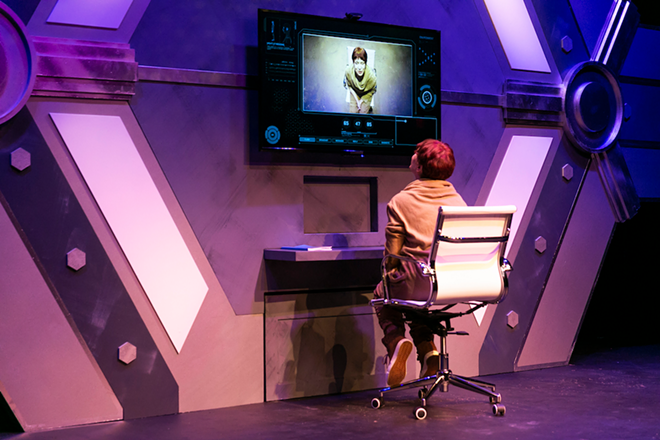The idea that humans need a substantial and immediate connection to one another, and to their environment, to be truly whole is the basis of some of the oldest spiritual and philosophical beliefs on Earth.
The fear that those connections and that completeness are being threatened by technology, and the isolation and self-absorption that emerging technologies sometimes seem to breed, is somewhat newer. Not nearly as new as Skype and iPhones, however, as evidenced by “The Machine Stops,” a short story published by British author E.M. Forster in 1909 that posits the divisive and destructive potential of then-unheard-of technology with a singularly disturbing prescience.
The story and its themes are the source material for an obsessively faithful adaptation currently in production at freeFall — one that, despite taking its inspiration from a piece of literature nearly 110 years old, is both compelling and thought-provoking in a very contemporary way.
Vashti and Kuno are a mother and son, respectively, living apart in a future society driven underground by some unspecified cataclysm. Members of this peaceful global society exist in near-total isolation, living in their individual rooms and spending time communicating and sharing personal-interest lessons with each other via a video messaging screen (a “plate”) and system similar to Skype or FaceTime while all their needs — food, hygiene, entertainment — are provided for by an ostensibly sentient artificial intelligence known as the Machine.
Vashti is perfectly happy with this state of affairs. Kuno, for his part, is not. He begs his mother to come visit him, and eventually coaxes her from her ensconcement; her unhappiness at having to travel is only compounded when she arrives, and he tells her of his disenchantment with the way their lives are lived. He further admits to escaping their underground confines and exploring the supposedly uninhabitable surface of the blasted Earth. His tale provides one of the play’s most moving scenes, as two athletic avatars, one male (Adam Kezele) and one female (Megan Morgan), emerge to evoke Kuno’s adventure by fluidly climbing on and swinging from an on-set support beam and dangling aerialist’s silk.
Convinced of her son’s madness, Vashti returns to her room and her lessons, which are little more than rehashed navel-gazing.
As time goes by, the dependence of Vashti and the majority of society on the Machine develops into religious worship, even as the Machine begins to show signs of breaking down, setting up the collision of Vashti’s desperate reliance on the Machine for her physical and spiritual needs with Kuno’s insistence that there must be more if life is to have meaning.
Actors Rob Glauz and Ann Morrison imbue Kuno and Vashti with unsettling realism. Morrison, in particular, shines, even as she spends much of the 70-minute production facing her “plate” with her back to the audience — which must constantly grate against all of her training and actorly instincts. Then again, Glauz has to sit offstage and communicate with and react to her live in real time via video messaging; that can’t be easy, either. The spare, retro-futuro-industrial set is perfect, and the details of the plate’s user interface (there are two screens in addition to Vashti’s, positioned closer to and facing the audience) are quite believable. Eric Davis’s direction is right for the set and the emotional-yet-restrained feel, and the sound and technical elements, which include not only the plate’s display but also multiple voiceovers, are flawless.
If The Machine Stops has one problem, it’s the play’s insistence on its reverence to Forster’s original story. In a talkback after the performance, Davis emphasized the production’s faithfulness; much of the dialogue is taken directly from the text, and while the themes and details of the story are strikingly modern, its writing style is of its time, and occasionally by turns turgid, purple or austere. Those lines can’t obscure the emotional and intellectual impact of the play, though, and through the combination of ace performances and provocative ideas, The Machine Stops provides not only an hour-plus of worthy entertainment but food for thought, as well.

















